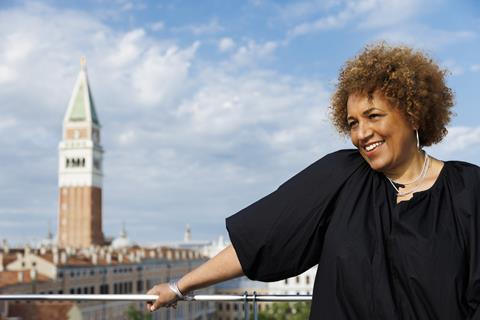Three of curator Lesley Lokko’s collaborators in Ghana refused entry to Italy just days before the event starts
Organisers of this year’s Africa-themed Venice Architecture Biennale have become embroiled in a row with the Italian government just days before the event opens after several participants from Ghana were denied visas.
Three men who have been collaborating with the festival’s curator Lesley Lokko for nearly two years have been refused entry to Italy to attend the exhibition’s trial viewings.
Daniela D’Orlandi, the Italian ambassador to Ghana, told Building Design that the three men did not meet the requirements to enter the European Union’s Schengen Area.
But the event’s curator Lesley Lokko has accused d’Orlandi of trying to “make her mark” with the Italian government, which has been led by the right-wing conservative Brothers of Italy party since last year’s general election.

This year’s Biennale, titled The Laboratory of the Future, officially opens to the public on Saturday 20 May and will run to 26 November at the Giardini, the Arsenale and Forte Marghera.
It will focus on Africa for the first time in its 43-year history, with more than half of its 89 participants coming from the continent or the African diaspora.
> Also read: Biennale countdown enters final fortnight
Lokko, a Ghanaian-Scottish architect, academic and writer, is the founder of the African Futures Institute (AFI), an architecture school in Accra, Ghana, and the Graduate School of Architecture in Johannesburg, South Africa.
She had asked six of her collaborators working as part of a team in Ghana to be on site in Venice for the exhibition’s vernissage, a pre-opening period starting on 18 May.
Lokko said: “They are all educated young Ghanaian men with good jobs, working for the AFI. We are covering all expenses, with invitations from La Biennale, who have been unbelievably supportive in the matter.”
> Also read: Lesley Lokko handed OBE in New Year Honours List
A source from La Biennale di Venezia said attending the pre-opening would be a “significant moment that concludes the job to which they have dedicated their work with great passion and commitment over the past months”.
“We applied for six visas for them as direct collaborators, as is routine for all collaborators. Lodging had been found for all of them in Venice, and return tickets to Ghana already reserved.
“The visas were denied to three of the collaborators, and one of them is still awaiting a response. We are currently in contact with the competent authorities to find a solution.”
In a post shared on Twitter, Lokko claimed d’Orlandi had accused her of “trying to bring ‘non-essential young men’ into Europe”.
“The Biennale have done everything they possibly can to assist, but to no avail,” she said, adding that Biennale president Roberto Cicutto and general manager Andrea del Mercato had been unable to “sway an ambitious career diplomat looking to make her mark with a right-wing government”.
D’Orlandi insisted the Italian embassy in Ghana was “deeply committed to promote collaboration” between the two countries and “spares no efforts to facilitate the participation of Ghanaian artists to important Art Exhibitions or events scheduled in Italy”.
She said it would be “limiting to solely focus on some visa denials, which derive from the application of a law that Italy and the other Schengen countries are required to observe.”
Neither she nor Lokko have shared the specific reasons why the visas for the three men were denied.
D’Orlandi said: “The Schengen legislation imposes an assessment not of the purpose of the trip or the reliability of the invitees, but of the possession of the requirements envisaged by each applicant, and that if these are not satisfied we are unable to issue the related visa.
“As far as Ms. Lokko’s delegation is concerned, out of six applicants we have issued visas for half of them, that is those who met the Schengen requirements.”
She added that the embassy considers the 2023 Biennale’s focus on Africa “very valuable, as it can unleash a great potential and a further boost to our cultural relations.”
The event will begin at the central pavilion in the Giardini, where 16 practices representing a “distilled force majeure” of African culture will exhibit work, according to the Biennale website.
Works by young African and African diaspora participants dubbed “Guests from the Future” will be shown throughout the event’s exhibitions, which will be based on the twin themes of decolonisation and decarbonisation.
The international jury, nominated by Lokko, includes Italian architect and curator Ippolito Pestellini Laparelli, Palestinian architect and curator, Nora Akaw, American director and curator of The Studio Museum di Harlem, Thelma Golden, South African founder and co-editor of Cityscapes Magazine, Tau Tavengwa, and Polish architect, educator and researcher Izabela Wieczorek.
















No comments yet